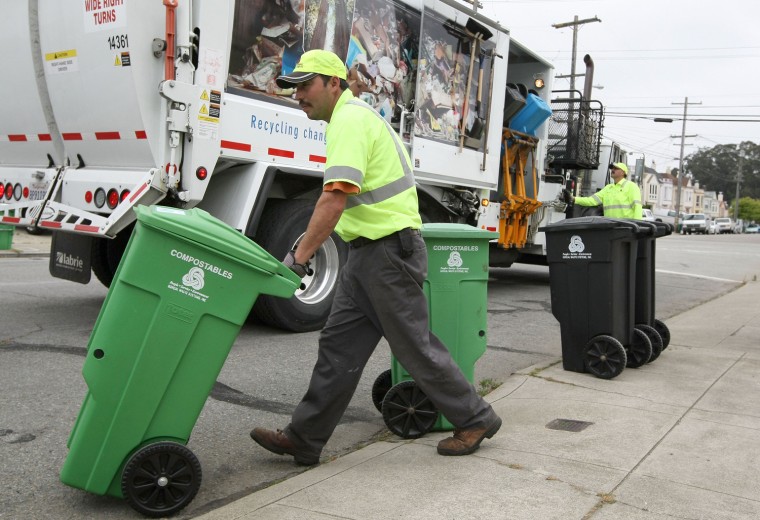Trash collectors in San Francisco will soon be doing more than just gathering garbage: They'll be keeping an eye out for people who toss food scraps out with their rubbish.
San Francisco this week passed a mandatory composting law that is believed to be the strictest such ordinance in the nation. Residents will be required to have three color-coded trash bins, including one for recycling, one for trash and a new one for compost — everything from banana peels to coffee grounds.
The law makes San Francisco the leader yet again in environmentally friendly measures, following up on other green initiatives such as banning plastic bags at supermarkets.
Food scraps sent to a landfill decompose fast and turn into methane gas, a potent greenhouse gas. Under the new system, collected scraps will be turned into compost that helps area farms and vineyards flourish. The city eventually wants to eliminate waste at landfills by 2020.
Chris Peck, the state's Integrated Waste Management Board spokesman, said he wasn't aware of an ordinance as tough as San Francisco's. Many cities, including Pittsburgh and San Diego, require residents to recycle yard waste but not food scraps. Seattle requires households to put scraps in the compost bin or have a composting system, but those who don't comply aren't fined.
"The city has been progressive, and they've been leaders and it appears that they're stepping out of the pack again," he said.
Fines to be enforced in 2010
San Francisco officials said they aren't looking to punish violators harshly.
Waste collectors will not pick through anyone's garbage, said Robert Reed, a spokesman for Sunset Scavenger Co., which handles the city's recyclables. If the wrong kind of materials are noticed while a bin is being emptied, workers will leave what Reed called "a love note," to let customers know they are not with the program.
"We're not going to lock you up in jail if you don't compost," said Nathan Ballard, a spokesman for Mayor Gavin Newsom who proposed the measure that passed Tuesday. "We're going to make it as easy as possible for San Franciscans to learn how to compost."
A moratorium on imposing fines will end in 2010, after which repeat offenders like individuals and small businesses generating less than a cubic yard of refuse a week face fines of up to $100.
Businesses that don't provide the proper containers face a $500 fine.
Proponents: Others will follow SF's lead
Sean Elsbernd, one of the two supervisors who opposed the proposition that passed 9-2, said the measure was "over-the-top" and that calls to his office Wednesday were critical of the new law.
"This is just going to aggravate and aggrieve homeowners who are doing their best," said Elsbernd.
But proponents say it is important to get people's attention about the importance of keeping those biodegradable materials out of landfills.
Ballard predicted that recycling food scraps eventually will seem as ho-hum as saving aluminum cans and newspapers.
"That used to seem like such a chore," he said. "Now we do it every day."
Newsom was expected to sign the measure if the board passes it in a final vote next week.
